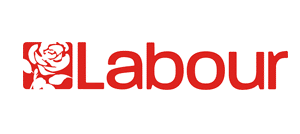Palestinian Territories
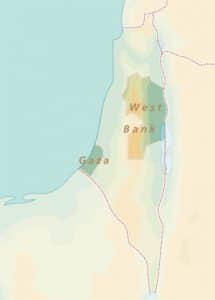
After years of strive between Hamas and Fatah, rapprochement between the two parties resulted in an announcement that Palestinian general elections were to take place in May of 2021. The elections would have been the first in 15 years. However, in April of 2021, President Abbas announced that the elections would be postponed for an indefinite period of time. Abbas stated that the reason for the postponement was the refusal of Israel to let Palestinians in Jerusalem participate in the elections. However, critics argue that the decision to postpone is due to the expectations that Hamas will win the elections. The move to postpone the general elections has been widely denounced by Palestinians and resulted in protests against the Palestinian Authority (PA). Until this moment, the elections have not yet taken place and no new date has been set.
The PA’s popularity has further deteriorated after the 2021 Israeli-Gaza war. The war erupted in May of 2021 and has been the most violent conflict since the previous war with Israel in 2014. The conflict erupted on the 10th of May, after tensions had been simmering for weeks in Jerusalem. The possible eviction of several Palestinian families from East Jerusalem had been leading to protests and tensions between Palestinian protestors and Israeli police and right-wing Israeli activists. On the 10th of May, Israeli police responded to increased protests by raiding the Aqsa Mosque, one of Islam’s holiest sites, in order to keep Palestinian protestors from throwing stones. As a response to the raid militants in Gaza fired rockets at Israel. Israel responded by carrying out airstrikes on Gaza. The conflict lasted for 11 days until a ceasefire was established on the 21st of May.
In the same time period in 2022, tensions in Jerusalem and the West Bank were rising again. Various suicide attacks had rocked Israel – these did not seem centrally coordinated. Also, fierce protests around the Al-Aqsa Mosque by Palestinians during Ramadan were brutally met by Israeli security forces. These forces also arrested many in Palestinian areas such as the city of Jenin. Unrest between Israeli security forces and Palestinian demonstrators entered a new low when the famous Al-Jazeera journalist Shireen Abu Akleh was shot and killed in Jenin, West Bank. An independent investigation now needs to find out whether Israeli forces bare the responsibility for her death. The Palestinian Authority has already referred the case up to the ICC.
Internationally, many states do not yet recognize Palestine as a sovereign nation. However, in September 2015 the UN General Assembly approved a proposal to raise the Palestinian flag at its headquarters, a symbolically important move. Still, its status is not recognized by the United Nations, Israel and major Western nations such as the United States. Previously, Palestinian President Mahmoud Abbas submitted a request to join the United Nations as a full member state in 2011, but stalled this request a year later. Instead he pursued a ‘non-member observer status’, which was granted in 2012 by a large majority of the Assembly.
-
Want to get notified by mail when this country gets updated?
Subscribe to our newsflash below!
Key Info
1 Political Situation
Under the British Mandate, “Palestine” referred to the region which now includes the State of Israel and the Palestinian Territories – the West Bank and Gaza Strip. In 1948, Israel declared independence according to the United Nations partition plan for Mandatory British Palestine. The envisaged Jewish state would comprise 56 percent of the mandate territory. Palestinians, supported by surrounding Arab countries, rejected the partition plan. The ensuing Arab-Israeli War (1948-1949) – known in Israel as the War of Independence and in Palestine as the Nakba (the catastrophe) – resulted in the occupation of the West Bank (Including East Jerusalem) by Transjordan and the Gaza Strip by Egypt. More than 700,000 Palestinian Arabs became refugees. It was the first in a series of wars fought between Israel and its Arab neighbours. During the 1967 ‘Six Day War’, Israel subsequently gained control over Gaza and the West Bank ignoring the so-called Green Line that was agreed upon in the 1949 Armistice Agreements. The Green Line used to mark the line between Israel and the West Bank, Gaza Strip, Golan Heights and Sinai Peninsula (the latter was returned to Egypt in 1982).
Under Israeli occupation Palestinian dissatisfaction grew over the Jewish settlements on the West Bank. Palestinian (political) organizations like Fatah (founded in 1959), the Palestine Liberation Organization (PLO, founded in 1964) and Hamas (founded in 1987) were formed in this period. In 1987 the First Intifada (1987-1993) (literally translated as ‘shaking off,’ usually translated as ‘uprising’) broke out. The violence ended with the Oslo Accords in 1993, which called for the withdrawal of Israeli forces from parts of the Gaza Strip and West Bank and affirmed the Palestinian right to self-government within those areas through the creation of the Palestinian Authority (PA). Despite the momentum of the Israeli-Palestinian peace process at the time the effort became stalled.
During the Camp David summit in July 2000 Israel’s Prime Minister Ehud Barak, Chairman of the Palestinian Authority Yasser Arafat, and US President Bill Clinton aimed at reaching a “final status” agreement. In September that same year tensions between the Palestinians and Israeli’s escalated when Israeli Prime Minister Ariel Sharon visited the Temple Mount in Jerusalem during the election campaign. The outbreak of the Second Intifada (2000-2005) was a fact and peace negotiations were ended. However, after the death of Arafat in November 2004 and the subsequent election of the moderate Mahmoud Abbas as the new President of the PA, both Israel and the PA on a summit at Sharm el-Sheikh in 2005 declared their intentions of ending bloodshed and revitalizing the Roadmap for peace. However, the peace process reached a deadlock soon. While Israel withdrew from Gaza in September 2005, it continues to keep Gaza under blockade. Since 2005, Israel has only deepened its West Bank settlement project, and on the other hand, Palestinian political factions such as Hamas still refuse to recognise Israel’s right to exist.
Developments in 2021-2022
After a period of 15 years, the PA announced in 2021 that it would hold general elections in May of 2021. However, in April of 2021, President Abbas announced that the elections would be postponed for an indefinite period of time. According to Abbas the reason for the postponement was the refusal of Israel to let Palestinians in Jerusalem participate in the elections. He argued that elections could not take place before Palestinians living in Jerusalem would also be able to participate. However, critics of the PA argue that the decision to postpone is due to the expectations that Hamas will win the elections. Abbas’ decision to postpone would be due to a fear of the repeat of the 2006 elections, which were won by Hamas and led to a long-lasting division within Palestinian politics. The move to postpone the general elections has been widely denounced by Palestinians and resulted in protests against the regime of the Palestinian Authority (PA). Until this moment, the elections have not yet taken place and no new date has been set.
Abbas’ popularity has further deteriorated after the 2021 Israeli-Gaza war. The war erupted in May of 2021 and has been the most violent conflict since the previous war with Israel in 2014. The conflict erupted on the 10th of May, after tensions had been simmering for weeks in Jerusalem. The cause of the most recent war is a dispute over East Jerusalem, which is predominantly inhabited by Palestinians. A Supreme Court ruling that would decide over the possible eviction of several Palestinian families from East Jerusalem (Sheikh Jarrah) had resulted in several days of protests in the beginning of May. The protests led to skirmishes between Palestinian protestors and Israeli police and right-wing Israeli activists. The protests intensified after Israeli police had prevented Palestinians from gathering near one of the ancient gates of Jerusalem. This was seen as a provocation since gathering at these gates is custom during the month of Ramadan. On the 10th of May, Israeli police responded to increased protests by raiding the Aqsa Mosque, one of Islam’s holiest sites, in order to keep Palestinian protestors from throwing stones. As a response to the raid militants in Gaza fired rockets at Israel. Israel responded by carrying out airstrikes on Gaza. The conflict lasted for 11 days until a ceasefire was established on the 21st of May. The conflict cost the live of 243 Palestinians, including 100 women and children. On the Israeli side 12 people lost their live, including two children. While the PA remained on the sidelines during the conflict, a poll from September 2021 showed that the conflict increased the support for Hamas, with 45 percent of the respondents saying they belief the group should lead them. Only 19 percent of the respondents stated that Fatah should remain the leading party of Palestine, and 80 percent of the respondents believed that Abbas should resign.
US-Palestinian relations, which deteriorated due to Trump, have improved under President Biden. The new Biden administration is planning to repair US ties with the Palestinians, resuming hundreds of millions of dollars in economic and humanitarian assistance that was cancelled under Trump, and reopen the Palestinians’ diplomatic mission to Washington, which the Trump administration had shut down. The Biden government has also made it clear they want to re-establish the goal of a two-state solution as a priority in US policy on the Israeli-Palestinian conflict. However, no new peace initiatives have been initiated so far.
Leading up to the 2022 Ramadan, tensions rose between Israel and the Palestinian Territories. In Israel, eleven people were killed in three separate attacks. On March 31, two Palestinian men were killed by Israeli security forces at a massive arrest. Fifteen people were wounded, among whom an Israeli soldier. During Ramadan, hundreds have been wounded in various incidents in and around the Al-Aqsa Mosque in Jerusalem. Jews are allowed to visit but may not pray at the site. However, early on Sunday 17 April, Jewish worshippers were seen at the site, protected by Israeli security forces, causing various clashes between religious groups at the site. Israeli police said its forces entered the al-Aqsa mosque to “re-establish order”, sparking a major backlash from Arab political actors.
In the morning of May 11, 2022, Al Jazeera said that its well-known reporter Shireen Abu Akleh was shot by Israeli troops during a raid in Jenin, West Bank. Abu Akleh, 51, was a very well-known and beloved reporter on the Palestinian Territories. Reporters and activists have reacted in shock to the news. Abu Akleh went to a Jenin refugee camp to report a raid by Israeli security forces. The Palestinian ministry of health reported that she was hit in the head by live ammunition during the raid while wearing a press vest and helmet. The Palestinian Authority has referred the case up to the ICC, where it will be further investigated.
Fatah-Hamas split
With the victory of Hamas in January 2006 in the Palestinian legislative elections, the tide turned once again. Because of Hamas’ refusal to renounce violence and recognize Israel, the Islamic party is blacklisted as a terrorist organisation by the European Union, the United States and other governments. A Hamas and Fatah unity government failed, among other reasons, because it is not acceptable to the international community. Early in June 2007, violence between Hamas and Fatah intensified, culminating in the Battle of Gaza, from 7 to 15 June. This led to the current situation in which the West Bank is ruled by the government under PA President Mahmoud Abbas (Fatah), while Hamas controls Gaza. President Abbas decided to dissolve the unity government with Hamas and appointed an emergency government headed by Salam Fayyad. Hamas rejected this government stating that a new government needed to be ratified by the Palestine Legislative Council (PLC) – in which Hamas has a majority with 74 seats. After the Fatah-Hamas rift, the PLC ceased to function, with the President issuing laws by emergency decree.
Following the Hamas–Fatah split in 2007, numerous reconciliation attempts were undertaken. A 2012 deal paved the way for new parliamentary and presidential elections in the Palestinian Territories, but the accord fell apart during the 2012 municipal elections. New reconciliation initiatives were launched in the aftermath. In a 2017 Egypt-brokered agreement between the two parties, Hamas agreed to turn over control of Gaza to the Fatah-led PA, but while small steps were taken, most deadlines were not met. In February 2021, in Egypt’s capital, Palestinian factions including Fatah and Hamas reached an agreement on the “mechanisms” for new legislative and presidential elections, after a rapprochement between the two movements.
Israeli West Bank barrier
Since 2002, the barrier between Israel and the West Bank is one of the most controversial issues in the relationship between Israel and the Palestinian Territories. The 703 kilometer long barrier separates Israel and the Palestinian Territories mostly along the so-called ‘Green Line’, the territorial boundary the two parties agreed upon in 1949. Supporters of the barrier state that it is built to stop the acts of Palestinian terrorism, predominantly bus-bombings. Opponents of the barrier argue that Israel tries to annex Palestinian land illegally under the guise of security. In 2004, the International Court of Justice said the building of the barrier in occupied Palestinian territory is illegal, and demanded the construction stop immediately. More than a decade later, the wall is still standing. Moreover, since 2012 Israel has stepped up its efforts to fortify its border. In 2018 the Defense Department announced it would also build an underground wall on the border with the Gaza Strip against tunnels.
Women’s rights
According to Article 9 of the Palestinian Basic Law, which was amended in 2005, all Palestinians are equal before the law and there is no distinction between them on the basis of ethnicity, sex, colour, religion, political point of view or disability. Article 4, however, stipulates that the Sharia (Islamic law) is a main source of legislation, opening the door to discriminatory provisions. Despite the Basic Law’s guarantees described in Article 9, many laws currently in force do not penalize gender discrimination. The laws that do so are difficult to enforce due to weak institutional mechanisms for handling such cases. The Personal Status law, based on religious laws, puts women at a disadvantage in matters of marriage, divorce and inheritance.
Although the Palestinian Authority is making progress in improving the lives and legal rights for women in the West Bank, the victory of Hamas in the 2006 parliamentary elections have led to greater restrictions of women’s rights in Gaza, where the Sharia is implemented more strictly. Domestic abuse, rape and ‘honour killings’, in which relatives murder women for perceived sexual or moral transgressions, are common, and these crimes often go unpunished. In the West Bank, as noted before, the situation is better but such abuses are not uncommon. Under Hamas, women’s dress and movements in public have been increasingly restricted by the so-called morality police, who are tasked with enforcing orthodox Islamic customs. Palestinian women have advocated for protective laws and cultural shifts in the treatment of victims for a number of years. UN reports describe the issue of violence against women as multifaceted, as both the Israeli military and internal domestic abuse are perpetrators of violence against Palestinian women.
LGBTI rights in Palestine
Even though same-sex relationships are not criminalized in the West Bank, LGBTI individuals are still subject to ill treatment by the government. For example, in 2019, Palestinian Authority police said they would prevent activities by LGBTI-rights NGO alQaws for Sexual and Gender Diversity in Palestinian Society. This outraged human rights groups, but at the same time caused a wave of homophobic messages on social media inciting violence against members of the LGBTI community, including death threats. The Palestinian police quickly rescinded the statement. alQaws has documented eight cases of arbitrary arrests and ill treatment of LGBTI individuals by Palestinian security forces in the West Bank in relation to their sexual orientation or gender identity. In Gaza, where the Islamic Hamas continues to govern, Section 152 of the Penal Code criminalizes consensual sexual activity between individuals of the same gender, which is punishable by up to 10 years’ imprisonment.
Trump’s “deal of the century”
Amidst the Palestinian reconciliation the conflict with Israel continues. Since the end of the Obama era, no new peace initiatives have been launched. The approach of the Trump Administration has heavily favoured Israel, and Palestinian-US relations have seriously detoriated as a result. Trump moved the US embassy in Israel to Jerusalem, with the PLO threatening in return to withdraw recognition of Israel. Beginning of 2020 the Trump administration presented the ‘Deal of the Century’, which would give Israel sovereignty west of the Jordan river, a capital in an undivided Jerusalem, and control over Jewish enclaves and settlements scattered through the Palestinian territories. The PA, all Palestinian factions and the Arab League rejected the deal, as it would mean a conditions-based path to statehood in a patchwork of territory carved up by Israeli roads and settlements. The US peace plan has pushed Hamas and Fatah ahead on reconciliation, several meetings were held in the beginning of 2020, but no concrete roadmap has been implemented. The new Biden administration is planning to repair US ties with the Palestinians, resuming hundreds of millions of dollars in economic and humanitarian assistance that was cancelled under Trump, and reopen the Palestinians’ diplomatic mission to Washington, which the Trump administration had shut down. The Biden government has also made it clear they want to re-establish the goal of a two-state solution as a priority in US policy on the Israeli-Palestinian conflict.
Timeline
| 1923 | Palestinian Territories part of ‘British Mandate for Palestine’ |
| 1948 | Declaration of independence Israel and Arab-Israeli War |
| 1967 | Six Day War |
| 1973 | Yom Kippur war |
| 1987 | Start First Intifada |
| 1993 | Oslo Accords |
| 2000 | Second Intifada |
| 2002 | Beginning building Israeli West Bank barrier |
| 2004 | Death Yasser Arafat |
| 2005 | Mahmoud Abbas elected as President |
| 2005 | Withdrawal Israeli settlements from Gaza |
| 2006 | Victory Hamas in parliamentary elections |
| 2006 | Operation “Summer Rains” (Israeli intervention) |
| 2007 | “Battle of Gaza” violence between Fatah and Hamas (June) |
| 2008 | “Gaza War,” Operation Cast Lead (28 December) |
| 2012 | Operation Pillar of Defense |
| 2012 | UN votes to recognize Palestine as ‘non-member observer state’ |
| 2014 | Operation “Protective Edge” (July-August) |
| 2017 | The United States recognizes Jerusalem as capital of Israel |
| 2019 | The United States do not longer consider Israeli settlements illegal |
| 2020 | The United States presents ‘Deal of the Century’ which is immediately rejected by Palestinian leaders |
| 2021 | New parliamentary and presidential elections are announced by Abbas, but are later on postponed |
2 Elections
On a national level, the Palestinians elect a head of state – the president – and a legislature – the Palestine Legislative Council (PLC), a unicameral parliament consisting of 132 members. Since the election law of 2005 came into force, the Palestinian Authority has a mixed electoral system combining both a majority system (districts) and a system of proportional representation (lists). The law divides the 132 seats of the PLC equally between the majority system (66 seats) and the system of proportional representation (66 seats). The PLC is elected for a four-year term.
Based on the majority system, the Palestinian Territories are divided into 16 electoral districts (11 in the West Bank and 5 in the Gaza Strip). Each district is allocated a number of seats in the parliament according to the number of its population. Six out of the 66 seats allocated to the majority system are reserved for Christians, because it is considered the minimum quota for their representation in the council.
In the system of proportional representation, the whole country is considered as one electoral district. Following the election law, each electoral list must include a minimum of 7 candidates and a maximum of 66 candidates. Each list must also include at least one woman in the first three names, at least one woman in the next four names and at least one woman in each of the five names that follow in the list. Lists that receive a minimum of 2 per cent on the basis of the proportional representation system are allocated the number of seats proportional to the total number of votes that the list receives. Its population determines the number of seats each electoral district receives.
It is important to distinguish the Palestine Liberation Organisation (PLO) on the one hand and the Palestinian National Authority (PNA) on the other. The PLO was founded in 1964 aiming at liberating the Palestinian state with its 1947 borders. Until today it is the sole representative of the Palestinian Diaspora in international institutions as the United Nations (UN) and the Arab League. The PNA, on the other hand, was a direct result of the 1993 Oslo Accords, founded as a 5-year transitional body during which final status negotiations between Israel and the Palestinian Territories were to take place.
In 2007 President Abbas unilaterally changed the electoral law to full proportional representation system (list system). He insisted he could issue the change by decree as long as the PLC was unable to convene. The move was seen as a bid to lessen the chances of Hamas in the next election. Hamas declared the move to be illegal. In 2021, agreeing on the mechanisms for new elections, Hamas accepted the PLO’s status as the legitimate representative body of the Palestinian people, and a new proportional representation (national list) system for PLC elections, which is said to favour Fatah.
Local elections in 2021-2022
On March 26 2022, Palestinians in major West Bank cities went to the polls for the second round of local elections. In December 2021, a first round already took place in rural areas. No elections were being held in the Gaza strip, as Hamas boycotted the elections after President Mahmoud Abbas’ ruling Fatah party in the West Bank repeatedly suspended legislative and presidential elections. Israeli authorities denied elections from taking place in the annexed territories of East Jerusalem.
The Palestinian Central Elections Committee (CEC) published that 377,895 people voted – 52,82% of eligible voters. This turnout is considered as quite low. It is difficult to interpret results as 14% said to base their vote for political parties, while 42% would decide their vote on the provision of local services. Expectedly, independents won big in these elections, winning 64% of seats, up from 37% five years ago.
Some trends can be derived from the results. Various parties, Fatah and Hamas among them, list independent tribal-based candidates to be able to participate without being directly affiliated to a party. Fatah claimed to have won 60% of seats in major cities, including their independent candidates. In many cases Fatah had no competition and were the only option on the ballot.
Hamas ran various independent candidates who won seats in various cities. It is regarded unlikely that they ran without support of the Gaza-based party authorities, demonstrating that Hamas still has the intention of participating in elections. In many instances, they ran with the Popular Front for the Liberation of Palestine (PFLP). On the eve of the local elections, a PFLP-Hamas list won the Bethlehem University student elections, which is considered a blow to Fatah.
Gender representation
The new local election law of 2005 states that political parties must have at least one woman among the first three on the list, at least one woman among the next four, and one woman among every five for the rest of the list. This guarantees about 20 percent women among the candidates. Since the last legislative elections, 17 out of 132 seats (13 per cent) in the Palestinian Legislative Council are held by women.
Parliamentary elections
On 25 January 2006, the first elections since 1996 for the Palestinian Legislative Council were held. The Islamic Hamas, that contested at the List of Change and Reform, won 74 seats; an absolute majority. Fatah, that had effectively been in power in the last several decades, received a severe blow winning only 45 seats.
According to analysts, it was Hamas’ focus on clean policy and its successful attacks on widespread corruption within the Fatah-led Palestinian Authority that provided for its electoral victory. International observers considered the elections to be conducted quite fairly, showing Palestinian commitment to democratic elections, also considering the high turnout rate of around 74 per cent. However, there were some reports of problems during election day itself. Voters in East Jerusalem were not provided voting privacy, and it was said that Fatah had used Palestinian Authority resources for its campaign, whereas in many mosques campaigning activities on behalf of Hamas (List of Change and Reform) were reported.
|
Alliances and Parties |
Seats* |
|
Hamas (List of Change and Reform) |
74 (29/45) |
|
Fatah |
45 (28/17) |
|
Popular Front for the Liberation of Palestine |
3 (3/0) |
|
The Alternative |
2 (2/0) |
|
Independent Palestine (Palestine National Initiative and independents) |
2 (2/0) |
|
Third Way |
2 (2/0) |
|
Independents |
4 (0/4) |
|
Total |
132 (66/66) |
* Total seats (proportional/district seats)
On 29 March 2006 President Mahmoud Abbas swore in – much to the displeasure of among others the EU and the United States – Hamas’ 24-member cabinet led by Prime Minister Ismail Haniya. This cabinet consists mostly of Hamas members and includes one Christian and one woman. The government’s political programme stressed the need for comprehensive reform within the Palestinian Territories, fighting corruption and enforcing the rule of law as well as democratic principles and institutions. It only considered negotiations with Israel (consequently referred to as ‘the occupation state’) if Israel completely withdraws its settlements from the Palestinian Territories. Until then, the government recognized any form of resistance as a legitimate right of the Palestinian people to end the occupation.
Presidential elections
The most recent Palestinian presidential elections took place on 9 January 2005 in the West Bank and Gaza. In accordance with the Palestinian Basic Law, these elections were to be held within 60 days after the death of former President Yasser Arafat. Seven candidates contested in the election. Three of them withdrew during the campaign.
PLO chairman Abbas won over 62 per cent of the votes, with independent Mustafa Barghouti coming second, winning 19 per cent of the votes. Palestinian Legislative Council member and Fatah leader in the West Bank Marwan Barghouti was seen as the only candidate who could hope to seriously compete against Abbas. However, his proposed candidacy met with resistance from Fatah activists, fuelling rumours that the Fatah party was internally divided along generational lines. After successive contradictory announcements, Marwan Barghouti retired from the race due to discussions between his representatives and the Fatah leadership.
|
Candidate |
% of votes |
|
Mahmoud Abbas (Fatah) |
62.52 % |
|
Mustafa Barghouti (Independent) |
19.48 % |
|
Taysir Khald (Democratic Front for the Liberation of Palestine) |
3.35 % |
|
Abdel Halim al-Ashqar (Independent) |
2.76 % |
|
Bassam al-Salhi (Palestinian People’s Party) |
2.67 % |
|
Sayyid Barakah (Independent) |
1.30 % |
|
Abdel Karim Shubeir (Independent) |
0.71 % |
|
Invalid Ballots |
3.82 % |
|
Blank Ballots |
3.39 % |
|
Total |
100 % |
The election campaign faced some problems – Mustafa Barghouti was arrested by Israeli forces when he was on his way to hold an election speech in East Jerusalem; other candidates were denied access to East Jerusalem as well – due to the widespread blockade of the Palestinian Territories by Israel. Also on election day, a number of incidents were reported. Voting was controversially extended for two hours, apparently at the request of Fatah, which led to the subsequent resignation of the head of the Central Elections Commission. Despite all this, international observers considered the elections to have been conducted fairly. The turnout rate was around 48 per cent according to the Palestinian Election Commission.
3 Political Parties
Social Democratic Parties
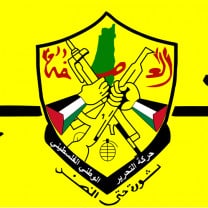
Number of seats: 45
Fatah is a secular, nationalist movement with the aim of establishing a Palestinian state. It’s political ideology is generally regarded as a social democratic. Fatah was formed in the late 1950’s, and derives its name from Harakat at-Tahrir al-Filastini (“Movement for the liberation of Palestine”). It was incorporated into the PLO (Palestinian Liberation Organisation) in 1969 and has become its most powerful group.
In its beginning phase, Fatah promoted an armed struggle against Israel, and in the 1960’s and 1970’s carried out many attacks on Israel from either Lebanon, Jordan or Gaza. After the Six Day war in 1967 the group moved to Jordan and Lebanon subsequently. They resided in Lebanon until 1982, when Israel invaded the country due to Palestinian guerrilla activity along the Lebanese-Israeli border.
In 1988, in order to gain more international support, Arafat denounced the use of terrorism by the PLO. A couple of years later in 1993 the PLO signed the Oslo Accords with Israel. As part of these Accords the Palestinian Authority was established and elections were held in 1996. Fatah won a lot of seats and Arafat won the presidency. Arafat, who died in 2004, was succeeded by Mahmoud Abbas as president and leader of Fatah in 2005. In 2006 Fatah lost their parliamentary majority to Hamas, they subsequently formed a coalition together but it collapsed in 2007 after Hamas violently took control of the Gaza Strip. In 2011 Hamas and Fatah reconciled briefly, but at the 2012 municipal elections, however, the two groups were at odds with each other again, with Hamas boycotting the election. Fatah claimed victory in the municipal elections but there were claims by human rights groups and political opponents that vote rigging and political violence had influenced the election results.
In October 2017 Egypt brokered an agreement between Fatah and Hamas, and in 2021, Hamas and Fatah agreed to hold elections that year in another Egypt-brokered agreement. Fatah has observer status within the Party of European Socialists (PES) and is a full member of Socialist International (SI).
Fatah's own internal divisions are increasingly overshadowing the rift with Hamas: in its official statements, Fatah is united and will participate in the 2021 elections under a unified list, but there are ongoing disagreements within the party. For example, dismissed Fatah leader Mohammad Dahlan and his new party, the Democratic Reform Current, wished to run on a joint list with Fatah in the upcoming elections, but Fatah rejected the proposal, causing the party to now run alone.
Number of seats: 2
The Palestinian National Initiative (PNI) is a political movement that was launched in 2002 by prominent Palestinian activists, politicians and academics. It has two seats out of 130 in the Palestinian Legislative Council. The PNI has an observer status within Socialist International.
The PNI wants to establish a just and durable peace, using only mass popular nonviolent struggle. The list describes itself as a ‘democratic third force’, opposing the dichotomy of ‘the corruption of Fatah’ and ‘the fundamentalism of Hamas.’ Its main goals are the creation of a Palestinian state within the pre-1967 borders and with Jerusalem as its capital city, the establishment of a democratic government- and system, and standing up for marginalized groups within Palestinian society.
The PNI stresses the importance of a viable civil society – which forms an important pool of supporters of the PNI. The PNI also tries to reach out to Palestinians abroad, and has established diplomatic relations with countries in Europe and the rest of the world. Its current leader is Mustafa Barghouti, who is also one of the founders of the PNI.
Other Parties
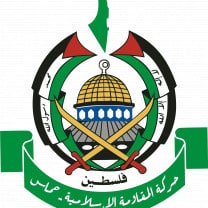
Number of seats: 74
Hamas (Harakat al-Muqawama al-Islamiyya, Islamic Resistance Movement) is a Palestinian Islamist resistance movement, founded by Sheikh Ahmed Yassin during the first intifada (Palestinian uprising) in 1987. It is a spinoff of Egypt's Muslim Brotherhood, and the group aims to liberate Palestine from Israeli occupation. It’s founding charter, published in 1988, does not recognize Israel and calls for it to be destroyed and replaced by an Islamic state. Hamas initially became popular among the Palestinian population for delivering social welfare programmes. Over the years it has become notorious for carrying out suicide bombings against Israel though, and is therefore labelled a terrorist organization by the United States and the EU among others.
Hamas was a stance opponent of the Oslo peace accords, signed in 1993 and 1995, between Israel and the Palestine Liberation Organisation (PLO). In the years after the Accords the military wing of Hamas, The Izz ad-Din al-Qassam Brigades, carried out several attacks on Israeli civilians and soldiers. The military and political wings have been at odds since the last Gaza war (2008-2009) though, as the The Izz ad-Din al-Qassam Brigades wanted a more aggressive approach towards Israel than the political wing of Hamas.
Since its founding, the contacts between Hamas and the PLO and Fatah have been far from warm. Hamas did not recognize PLO’s monopoly on Palestinian representation and decision-making and Fatah, being nationalistic rather than Islamic, tried to exclude Hamas from the political platform. With the start of the second intifada the relations between the two main political power bases temporarily improved. However, after the parliamentary elections of January 2006 in which Hamas won a decisive majority, relations dramatically worsened again leading to the battle of Gaza after which Hamas retained control of Gaza while its officials were ousted from government positions in the West Bank. In response Israel and Egypt have blocked all borders with Gaza, which has severely damaged the territory’s economy. In February 2017 Hamas members elected Yahya Sinwar as their new leader, succeeding Ismail Haniya. One month later, in March 2017, it was announced that the movement had drafted a new charter with a more moderate tone, describing itself as a Palestinian resistance movement against Israeli occupation. With the new charter, Hamas distanced itself from the Muslim Brotherhood, and refrained from mentioning a holy war against the Jews, stating: “Our conflict is with the Zionist project, not with the Jews because of their religion. Hamas does not wage a struggle against the Jews because they are Jewish but wages a struggle against the Zionists who occupy Palestine.” The new programme will however not formally replace Hamas' 1988 founding covenant.
Number of seats: 3
The Popular Front for the Liberation of Palestine was founded in 1967 by members of the Arab National Movement (founded in 1951) and other factions as a Marxist-Leninist, nationalist resistance movement. During the seventies it became the second largest member of the PLO, after Fatah. However, the PFLP grew more disillusioned with the PLO’s practices and condemned the Oslo Accord of 1993 and officially boycotted the Palestine Authority’s first indigenous elections. Considering the relations with Israel PFLP originally favoured a hard-line stance, not recognizing the Israeli right for an independent state. In the late nineties it became more moderate though.
In the 2006 parliamentary elections PFLP took part as the Martyr Abu Ali Mustafa list, named after Abu Ali Mustafa, the General Secretary of the PFLP who was assassinated by Israeli forces in 2001. It won 3 seats of the popular vote in the 2006 parliamentary elections. It gained only one seat in the municipal elections of 2004-2005.
The EU and the US consider the PFLP to be a terrorist organisation due to the numerous deadly attacks on Israeli civilians – and on the Israeli Minister for Tourism Rehavam Zeevi in 2001. The attacks by the PFLP’s armed wing, the Abu Ali Mustapha Brigades, are a retaliation of the assassination of Abu Ali Mustafa. In the early seventies the PLFP was the first organisation to openly use terrorist attacks as a means of establishing a Palestinian state. After the death of Mustafa, the former Mathematics teacher in Ramallah Ahmad Sa'adat was elected General Secretary on 3 October 2001. In January 2002, PNA authorities detained Sa’adat without charge in a prison in Jericho, following a compromise agreement with the US, UK and Israel. In 2006 the US and Britain withdrew monitors from the Jericho prison holding Sa’adat, following which Israel raided the facility and took Sa’adat and six others into custody. He is currently in solitary confinement in an Israeli prison. The PFLP-GC (Popular Front for the Liberation of Palestine - General Command) as well as the Democratic Front forthe Liberation of Palestine (DFLP) originate from the PFLP.
4 Biographies
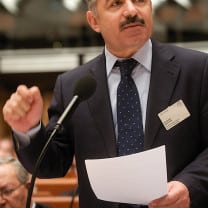
Mohammed Shtayyeh was born in 1958 in Nablus. He was Minister of Public Works and Housing in the period from 2005-2006 and later on from 2008-2010. He was appointed Prime Minister of the west-Bank based Palestinian Authority (PA) on 10 March 2019, succeeding Rami Hamdallah.
Dr. Shtayyeh began his professional career as a professor at Birzeit University. In 1993, he became responsible for the financial management of the Palestinian Economic Council for Development and Reconstruction (PECDAR), an organization that developed policies toward national projects of Palestinian statehood. In 1996, he became Minister of PECDAR. In 2009 he was elected Head of the Economic Commission, and the Commission for Political Mobilisation to the Fatah Central Committee. Dr. Shtayyeh is founder of the Palestinian think tank Institute for Regional Studies and the Women's Fund for Microcredit. He also headed the Palestinian Delegation to the Multilateral Talks on Regional Economic Cooperation and he served as the Secretary General of the Palestinian Central Elections Commission. Moreover, he is the Governor for Palestine at the Islamic Development Bank in Saudi Arabia and at the Arab Planning insitute, in Kuwait.
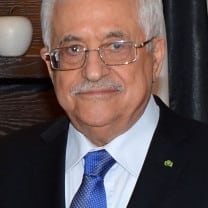
Mahmoud Abbas, also known as Abu Mazen (father of Mazen, his deceased son), was born in 1935 in the city of Safed a town in present-day northern Israel. He and his family fled to Syria during the 1948 Arab-Israeli war. Abbas graduated from the University of Damascus, after which he went to Egypt to study law. Abbas later entered graduate studies at the Patrice Lumumba University in Moscow where he earned a Candidate of Science degree.
Abbas co-founded Fatah together with Yasser Arafat and a number of others in the late 1950s in Kuwait. He established contacts with left-wing Israelis in the 1970s and was the main Palestinian architect of the 1993 Oslo accords, which led to the foundation of the Palestinian Authority.
In March 2003 he was appointed as Prime Minister. Plagued by power struggles with Arafat over the control of the Palestinian security apparatus and over planned reforms, Abbas resigned in September 2003. However, he succeeded Yasser Arafat in 2004 as the leader of the Palestinian Liberation Organisation (PLO), having been Arafat's deputy since 1969.
After the death of Arafat on 11 November 2004, Abbas won the January 2005 presidential elections. His current term was set to have ended in January 2009, but in 2008 he announced he extended his term by another year in order to allow presidential and parliamentary elections to be held at the same time. Hamas denounced the move. In November 2009, Abbas said he would not stand again in elections scheduled for 24 January 2010, in protest against the continuing impasse in attempts to resurrect peace talks with Israel. The elections were postponed, and he has continued in office on an interim basis.
Many analysts regard Mahmoud Abbas as a moderate. He has condemned the armed Palestinian uprising and favours the resumption of negotiations with Israel.
Abbas, 85, has suffered in recent years from different health problems and remains a heavy smoker. Various hospitalizations in the past year have sparked rumors among Palestinians about his medical conditions and his alleged poor health.
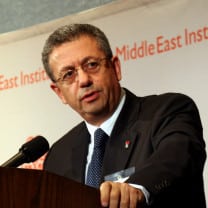
Mustafa Barghouti is the leader and co-founder of the PNI. He used to be a prominent figure in the Palestine People’s Party but left the party in 2002. Born in Jerusalem, Barghouti was trained as a doctor in the former Soviet Union and is known to many ordinary Palestinians for running a healthcare organisation (the Union of Palestinian Medical Relief Committees) that he established back in 1979.
Barghouti was Mr Abbas's main challenger as an independent candidate for the position of president in the 2005 elections, only after his jailed distant cousin Marwan Barghouti withdrew his candidacy. He came in second with a respectable 19.8 percent of the votes. Like Abbas, Barghouti sought an Israeli withdrawal from the Gaza Strip, the West Bank and also East Jerusalem, the release of Palestinian prisoners and campaigns for the right of Palestinian refugees to return to their homes.
Barghouti has been an advocate of the creation of a Palestinian state with Jerusalem as its capital, the right of return for refugees and the establishment of a democratic political system. He favours an immediate resumption of peace talks with Israel and peaceful resistance to the Israeli occupation. He has criticized the PLO and Palestinian Authority for corruption.
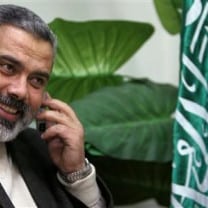
Haniyeh was born in the Egyptian occupied Gaza Strip in 1962. His parents were refugees from Ashkelon. He graduated from the Islamic University of Gaza in 1987 with a degree in Arabic literature. During his college period he became heavily involved with the Islamist movement. Through his affiliations he became part of the initial protests that would ignite the First Intifada in 1987. Being imprisoned by Israel following the protests, Haniyeh closely associated himself with the leadership of the newly formed Islamic Resistance Movement (Hamas). Becoming a prominent figure within the movement.
After Hamas founder Ahmed Yassin was released from prison in 1997, he chose Haniyeh to become his assistant. During the 2006 Palestinian elections, the leadership of Hamas, chose Haniyeh to become the head of their political bid. Under his leadership Hamas won a majority of 74 seats. Following the elections, Haniyeh became prime minister of the Hamas dominated government of the Palestinian Authority. The ensuing conflict between Hamas and Fatah led to the dismissal of Haniyeh. In May 2007 he stepped down in order to create a national unity cabinet. Between 2007 and 2014 he was involved in multiple attempts to create such a cabinet, but it never took off.
In late 2016 it was announced that Haniyeh would succeed Khaled Mashal as head of the Hamas Political Bureau.
Subscribe to our newsletter
